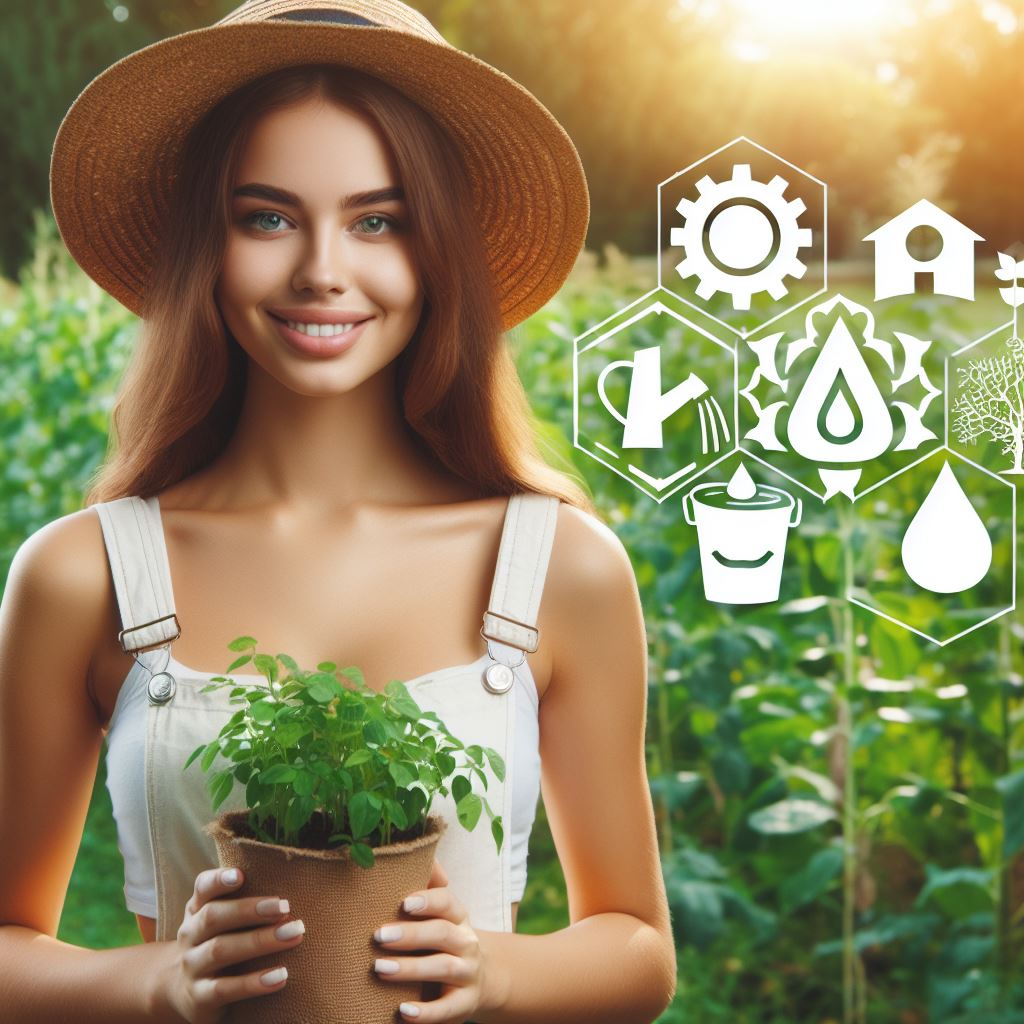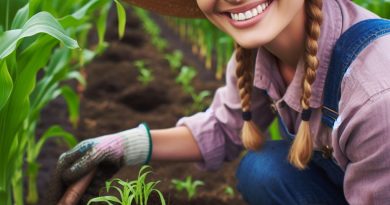Eco-Friendly Farming: Water-Saving Techniques Revealed
Last Updated on January 20, 2024
Introduction
Eco-friendly farming promotes sustainable practices and reduces harm to the environment.
Water conservation is particularly important in farming, as it is estimated that agricultural practices account for 70% of global water usage.
By implementing water-saving techniques, farmers can contribute to preserving this valuable resource.
This blog post will explore various water-saving techniques used in eco-friendly farming.
It will discuss strategies like precision irrigation, rainwater harvesting, and drip irrigation.
These methods aim to optimize water usage, reduce wastage, and improve overall farming efficiency.
Precision irrigation is a technique that uses advanced technologies to deliver the right amount of water directly to plant roots, minimizing runoff and evaporation.
Rainwater harvesting involves collecting rainwater for later use, reducing reliance on traditional water sources.
Drip irrigation ensures water is delivered slowly and directly to plant roots, reducing water loss through evaporation.
The blog post will also highlight the benefits of these water-saving techniques.
It will discuss how they can enhance crop yields, reduce water bills, and mitigate environmental impact.
It will emphasize the need for farmers to adopt eco-friendly practices that prioritize water conservation.
In short, this blog post aims to educate and inspire farmers to embrace eco-friendly farming practices.
By implementing water-saving techniques, farmers can contribute to a sustainable future by conserving water resources and promoting a healthier environment.
Understanding Water Usage in Agriculture
Water is an essential resource in agriculture, playing a vital role in crop growth and livestock production.
Understanding water usage in farming practices is crucial to promoting eco-friendly techniques that conserve this precious resource.
In this blog section, we will explore the overview of water usage in farming practices and shed light on the environmental impact of excessive water consumption.
Overview of Water Usage in Farming Practices
Irrigation methods and their water requirements
Irrigation is the process of supplying water to crops artificially.
Different irrigation methods, such as flood irrigation, drip irrigation, and sprinkler systems, have varying water requirements.
Efficient irrigation techniques, such as drip irrigation, can significantly reduce water usage while ensuring optimal crop growth.
Water consumption in livestock production
Water is vital for livestock health, hydration, and maintaining suitable conditions in animal housing.
Livestock consumption includes not only drinking water but also water usage for cleaning and cooling purposes.
Implementing efficient livestock watering systems and managing water sources carefully can help reduce water consumption in livestock production.
Environmental Impact of Excessive Water Usage
Depletion of natural water resources
Excessive water usage in agriculture can lead to the depletion of natural water sources, including rivers, lakes, and underground aquifers.
Over time, this can cause water scarcity and disrupts the balance of local ecosystems.
Conserving water in farming practices is crucial to preserving these valuable resources for future generations.
Water pollution due to agricultural runoff
When excessive water is used for irrigation or heavy rainfall occurs, agricultural runoff can carry excess nutrients, pesticides, and sediment into nearby water bodies.
This runoff can result in water pollution, harming aquatic organisms, degrading water quality, and posing risks to human health.
Adopting sustainable farming practices, such as planting cover crops and managing runoff effectively, can prevent water pollution.
Ways to develop and implement effective water-saving techniques
By understanding the water usage in agriculture and its impact on the environment, farmers and policymakers can develop and implement effective water-saving techniques. This can be achieved through:
Implementing water-efficient irrigation systems
Adopting modern irrigation methods, such as precision irrigation and micro-sprinklers, can precisely supply water to crops, minimizing wastage and maximizing efficiency.
Promoting water conservation practices
Encouraging farmers to adopt practices like mulching, which helps retain soil moisture, and using weather data to optimize irrigation scheduling can conserve water effectively.
Managing livestock water consumption
Improving livestock watering systems, such as installing automated watering troughs and using water-saving equipment, can minimize water waste in livestock production.
Implementing proper nutrient management
By adopting precise nutrient management plans and reducing fertilizer application, farmers can minimize nutrient runoff, preventing water pollution and protecting water quality.
In fact, understanding water usage in agriculture is vital for promoting eco-friendly and sustainable farming practices.
By implementing water-saving techniques, managing water resources carefully, and preventing water pollution, farmers can contribute to preserving our precious water resources and protecting the environment.
Together, we can make a significant difference in achieving a more sustainable and water-efficient agricultural sector.
Read: Rainwater Harvesting: A Farmer’s Guide to Sustainability
Water-Saving Techniques in Crop Cultivation
Precision irrigation systems
Crop farmers can utilize precision irrigation systems, such as drip and micro-irrigation technologies, for saving water.
These systems ensure efficient water distribution to crops, resulting in significant water conservation.
Precision irrigation minimizes water wastage caused by evaporation or runoff, making it a crucial technique in eco-friendly farming practices.
Moreover, it enhances crop productivity by providing water directly to plant roots, promoting healthier growth and reducing the risk of diseases.
Soil moisture monitoring and management
In addition to precision irrigation, soil moisture monitoring and management are essential for water-saving techniques in crop cultivation.
Understanding soil water content helps farmers determine the optimal timing and amount of irrigation required by their crops.
By accurately assessing soil moisture levels, farmers can avoid both overwatering and underwatering, leading to reduced water consumption.
Techniques like soil moisture sensors and satellite-based monitoring systems aid in efficient soil moisture management, enabling farmers to make informed decisions regarding irrigation.
Crop selection and rotation for water efficiency
Crop selection and rotation also play vital roles in water efficiency on farms.
Choosing drought-tolerant plant varieties is a wise strategy to minimize water usage.
These plants have adapted to thrive in regions with limited water availability, making them ideal options for eco-friendly farming.
Drought-tolerant plants require less irrigation and can withstand dry spells, making them sustainable choices for water conservation efforts.
Furthermore, diversifying crops brings various environmental benefits, including water conservation.
Planting a variety of crops helps maintain soil health, prevent soil erosion, and reduce pest problems.
Rotating crops disrupts pest cycles, reducing the need for chemical pesticides and promoting natural pest control.
Additionally, some plant species have specific water requirements, and diversifying crops allows farmers to balance water usage more effectively.
By alternating water-intensive and drought-tolerant crops, farmers can optimize water resources and minimize waste.
In essence, implementing water-saving techniques in crop cultivation is essential for eco-friendly farming.
Precision irrigation systems like drip and micro-irrigation, along with soil moisture monitoring and management, contribute to significant water conservation.
Crop selection and rotation, especially incorporating drought-tolerant plant varieties, further enhance water efficiency on farms.
By adopting these practices, farmers can contribute to sustainable agriculture and mitigate the impact of water scarcity on the environment.
Read: Smart Drip Irrigation: Boosting Farm Water Efficiency
Water Conservation in Livestock Production
Livestock production plays a crucial role in our society. However, it also has significant implications for water resources.
To mitigate these impacts, it is essential to adopt water-saving techniques that promote sustainability while maintaining productivity.
This section explores two key strategies: efficient animal watering systems and managing animal waste.
Efficient animal watering systems
Water is a vital resource for livestock, and providing them with continuous access to clean water is crucial for their health and well-being.
Automated watering systems have emerged as an innovative solution to ensure this accessibility while optimizing water usage.
Introduction to automated watering systems
Automated watering systems use technology to control water distribution to livestock.
These systems are designed to provide a constant supply of fresh water.
Benefits of controlled water distribution for livestock
Controlled water distribution systems offer several benefits.
First, they prevent water waste by delivering the right amount of water to each animal.
Second, they minimize contamination risks by reducing manure-soaked areas.
Efficient animal watering systems not only conserve water but also improve overall herd health and productivity.
By ensuring access to clean water, diseases and dehydration are minimized, leading to healthier livestock and increased efficiency in production.
Managing animal waste and its impact on water resources
Animal waste, if not properly managed, can have detrimental effects on water resources.
Manure contains high levels of nutrients that, when washed into water bodies, can cause eutrophication and harm aquatic ecosystems.
Implementing effective waste management practices is crucial to prevent this pollution.
Proper manure management techniques
Implementing proper manure management starts with responsible handling and storage.
Proper storage eliminates the risk of manure reaching water bodies, ensuring its safe disposal or use as fertilizer.
Prevention of nutrient runoff into water bodies
Nutrient runoff occurs when excess nutrients from manure enter rivers, lakes, or groundwater.
To prevent this, implementing strategies like buffer zones and vegetative cover can help absorb and filter nutrients before they reach water bodies.
By adopting these manure management techniques and preventative measures, livestock operations can reduce their overall impact on water quality.
Responsible waste management practices protect our water resources while also benefiting soil health and minimizing nutrient loss.
In general, water conservation in livestock production is crucial for sustainable and eco-friendly farming practices.
Efficient animal watering systems optimize water usage and ensure livestock have access to clean water.
Managing animal waste effectively prevents water pollution and the negative impacts of nutrient runoff.
By implementing these techniques, farmers can contribute to a more sustainable and environmentally friendly agricultural sector.
Read: Organic vs Conventional: A Deep Dive Analysis

Other Water-Saving Practices in Farming
Farming has come a long way in adopting eco-friendly practices, especially when it comes to water-saving techniques.
In addition to efficient irrigation systems and crop selection, farmers have implemented various innovative methods to minimize water consumption.
This section explores two key practices: cover cropping and mulching, as well as rainwater harvesting and water recycling.
Cover Cropping and Mulching
Cover cropping and mulching are techniques that have gained popularity in sustainable farming.
Cover cropping involves growing certain plants in between crop cycles to protect the soil and reduce evaporation.
Mulching, on the other hand, involves placing organic material on the soil’s surface.
Cover cropping provides several benefits in terms of water conservation.
By growing cover crops during fallow periods, farmers retain moisture in the soil and shield it from direct sunlight.
This helps prevent soil erosion, suppress weed growth, and enhance the soil’s ability to absorb and retain water.
Additionally, the decomposition of cover crops adds organic matter to the soil, improving its overall health and water-holding capacity.
Similarly, mulching offers significant water-saving advantages.
By covering the soil with organic materials such as straw, bark, or leaves, farmers can reduce evaporation and minimize weeds.
Mulch acts as a protective barrier, regulating soil temperature, conserving moisture, and promoting better water infiltration.
It also prevents soil compaction and erosion, ensuring the efficient utilization of irrigation water.
Rainwater Harvesting and Water Recycling
Rainwater harvesting is an effective method for collecting and storing rainwater for future agricultural use.
It involves the installation of rainwater collection systems comprising gutters, downspouts, and storage tanks.
When it rains, water is directed into the storage tanks for later use in irrigation.
Implementing rainwater collection systems helps farmers reduce their reliance on freshwater sources and lowers their overall water consumption.
By utilizing rainwater, farmers can effectively irrigate their crops while reducing the strain on groundwater and surface water supplies.
This practice is especially valuable in regions where water scarcity is a pressing concern.
Another water-saving practice is the recycling of water for non-potable uses in farms.
This involves the treatment and reuse of wastewater, primarily for tasks that do not require high-quality water, such as cleaning or irrigation.
By recycling water, farmers can significantly reduce their dependence on freshwater sources, contributing to sustainable water management.
In a nutshell, eco-friendly farming encompasses a range of water-saving techniques that go beyond traditional irrigation methods.
The adoption of cover cropping and mulching practices helps retain soil moisture, prevent erosion, and improve overall soil health.
Furthermore, rainwater harvesting and water recycling provide alternative water sources and alleviate the strain on freshwater supplies.
By implementing these practices, farmers can contribute to sustainable and water-efficient agriculture.
Read: Organic Farming Trends: What’s Next?
Conclusion
Water scarcity is a pressing issue that threatens the sustainability of agriculture.
By implementing water-saving techniques, farmers can significantly reduce their water consumption and contribute to a more eco-friendly farming system.
These techniques include drip irrigation, mulching, and precision farming.
It is crucial for farmers to recognize the importance of water conservation and embrace these water-saving techniques.
Not only will they contribute to environmental preservation, but they will also benefit financially by reducing their reliance on costly irrigation systems.
The future of sustainable agriculture lies in the hands of farmers who are willing to adopt and implement eco-friendly practices.
Water-saving techniques are just one aspect of sustainable farming.
As a society, we must continue to support and promote the adoption of such practices to ensure a secure and prosperous agricultural future.
By prioritizing water conservation and adopting these techniques, farmers can play a significant role in mitigating the impact of water scarcity on agriculture.
It is our collective responsibility to encourage and support their efforts, as it is vital for the well-being of both our environment and our food security.
Water-saving techniques are indispensable for eco-friendly farming. By incorporating these practices, farmers can minimize water waste and foster sustainable agriculture.
The future of our planet and food security depend on the widespread adoption of these techniques.
Let us all join hands and work towards a more water-efficient and environmentally conscious farming approach.


